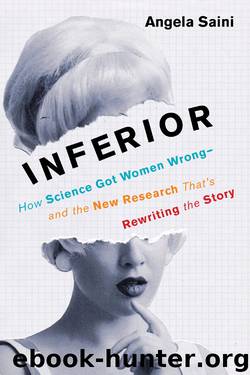Inferior by Angela Saini

Author:Angela Saini [Saini, Angela]
Language: eng
Format: epub, azw3
ISBN: 978-0-8070-7171-7
Publisher: Beacon Press
Published: 2017-04-06T16:00:00+00:00
It was April 1966.
Some of the most important names in anthropology had come together at the University of Chicago to debate what was then a fast-growing body of research about the world’s hunter-gatherers. The symposium they were all a part of was headlined “Man the Hunter.” And they would help shape the way a generation of scientists thought about human evolution.
The gathering was appropriately titled. The “man” in the title, as anyone attending would have guessed, really did refer to men, not to all humans. In almost no hunter-gatherer communities were women known to routinely hunt. Even so, this one activity was believed to be the most important in human evolutionary history. Hunting made men band together in groups and work cooperatively, so they could target their prey more effectively. It forced men to be inventive and create stone tools. Hunting may also have been what prompted men to develop language so they could communicate more effectively. By bringing home meat, followed the logic, men were able to provide themselves, women, and their hungry children with the densely packed nourishment they needed to develop bigger brains and become the smart species we are today.
Hunting was everything.
“In a very real sense our intellect, interests, emotions and basic social life—all are evolutionary products of the success of the hunting adaptation,” wrote leading anthropologists Sherwood Washburn and Chet Lancaster in their chapter of a 1968 book about the symposium, also titled Man the Hunter. The importance of the kill, dramatic as it was, would later be popularized for a wider audience in a 1976 book by Robert Ardrey, a Hollywood screenwriter who changed career to focus on anthropology. “It is because we were hunters, because we killed for a living, because we matched wits against the whole of the animal world, that we have the wit to survive even in a world of our own creation,” he wrote in The Hunting Hypothesis.
But for some anthropologists, this way of characterizing the past struck a bum note. For one thing, it utterly diminished the role of women. This wasn’t even a time when sexism could go easily unchecked. Universities were starting to offer courses in women’s studies and gender studies, and female life scientists and social scientists were becoming famous in their fields. Primatology was on its way to becoming a female-dominated discipline. How could anthropologists now claim that women were the sidekicks in human history? By the end of the conference a growing cadre of scientists—many of them women, but some men too—were outraged. Already marginalized for decades, the hunting hypothesis was threatening to airbrush women out of the evolutionary story altogether.
Capturing their feelings, in 1970 anthropologist Sally Linton (later publishing under the name Sally Slocum) presented a provocative retort at the American Anthropological Association’s annual meeting. It was titled “Woman the Gatherer: Male Bias in Anthropology.” Her words echoed those of suffragist Eliza Burt Gamble, whose critique of Charles Darwin and his contemporaries had been published around eighty years earlier. Linton passionately condemned
Download
This site does not store any files on its server. We only index and link to content provided by other sites. Please contact the content providers to delete copyright contents if any and email us, we'll remove relevant links or contents immediately.
Sapiens: A Brief History of Humankind by Yuval Noah Harari(13240)
Sapiens by Yuval Noah Harari(4696)
Homo Deus: A Brief History of Tomorrow by Yuval Noah Harari(4352)
Pale Blue Dot by Carl Sagan(4114)
Livewired by David Eagleman(3208)
Origin Story: A Big History of Everything by David Christian(3202)
Brief Answers to the Big Questions by Stephen Hawking(2942)
Inferior by Angela Saini(2882)
Origin Story by David Christian(2747)
The Evolution of Beauty by Richard O. Prum(2597)
The Gene: An Intimate History by Siddhartha Mukherjee(2558)
Signature in the Cell: DNA and the Evidence for Intelligent Design by Stephen C. Meyer(2556)
Aliens by Jim Al-Khalili(2442)
How The Mind Works by Steven Pinker(2292)
A Short History of Nearly Everything by Bryson Bill(2203)
From Bacteria to Bach and Back by Daniel C. Dennett(2185)
Sex at Dawn: The Prehistoric Origins of Modern Sexuality by Ryan Christopher(2179)
Endless Forms Most Beautiful by Sean B. Carroll(2130)
Who We Are and How We Got Here by David Reich(2096)
